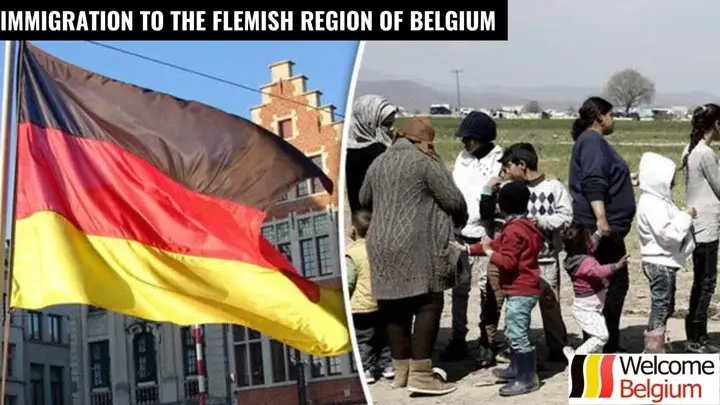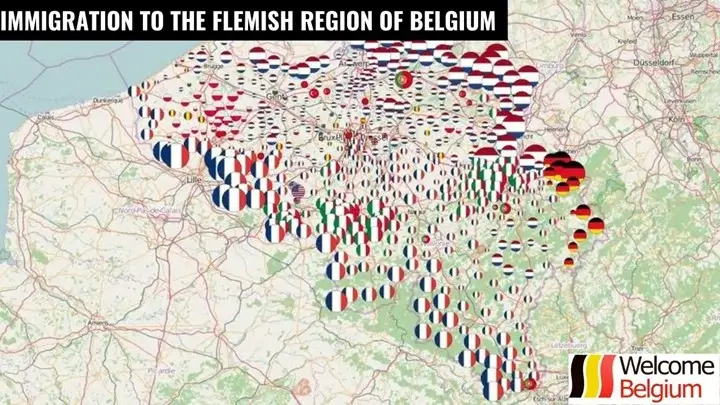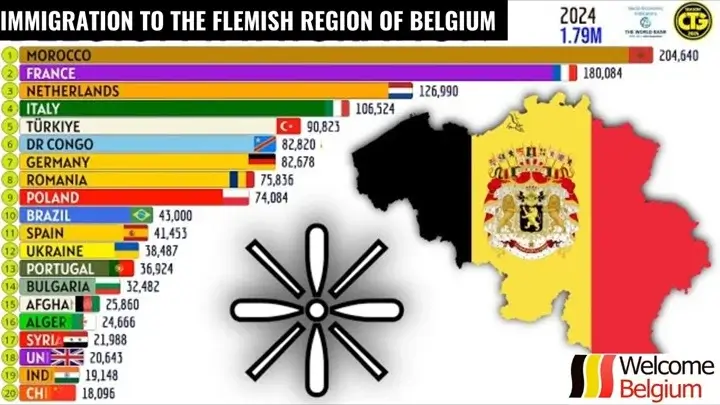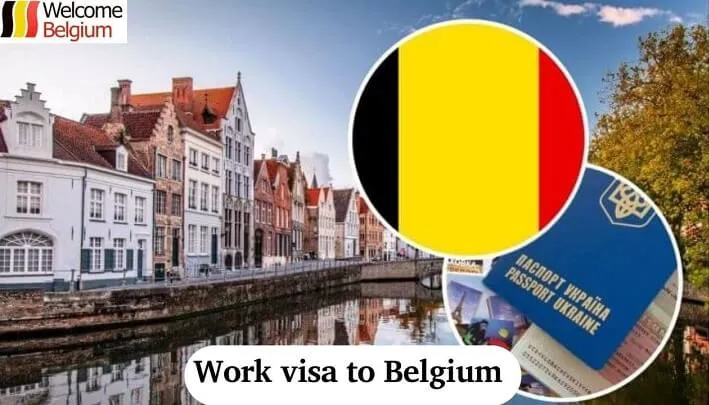Immigration to Belgium, and especially to the Flemish Region, is of interest to citizens of other countries. Flanders attracts both its highly developed economy and its high standard of living, education and employment opportunities. This region is considered one of the most densely populated and economically stable in Belgium, which makes it attractive to immigrants. In this article, we will look at the key aspects related to the immigration process to the Flemish Region and provide useful information on what to consider when moving.
Why choose Flanders
The Flemish Region is an administrative region of Belgium and is characterized by its economic activity and cultural diversity. It is a region with a high level of innovation, developed infrastructure and rich cultural heritage. Immigration to the Flemish Region of Belgium is an opportunity to become part of a multinational and dynamic society.
One of the factors that attract immigrants here is the developed economy and low unemployment. Large international companies developing technologies, logistics and production offer a variety of vacancies, which makes the region’s labor market attractive to specialists from different countries.
Types of immigration
Immigration to Flanders, Belgium, offers a variety of options for those planning to move to the region. Depending on the goals, whether it is work, study, family reunification or starting a business, everyone can choose the appropriate path to obtain the right of residence. Flanders attracts with its economic prospects, high quality of education and favorable living conditions, which makes this region especially popular among immigrants from all over the world.
Immigration to the Flemish region of Belgium can take place in several directions depending on the purpose of the move. Let’s consider the main options.
- Employment immigration. This is one of the most popular types of immigration, especially among professionals seeking employment in areas such as technology, medicine, engineering, and education. For employment immigration, you will need a work visa, which can be obtained through an invitation from an employer.
- Study immigration. Flanders is known for its prestigious universities and higher education institutions, such as Ghent University and the University of Leuven. Students from all over the world come here to receive a quality education. A student visa is a key document for obtaining the right to reside in Belgium during your studies.
- Family immigration. If you have relatives permanently residing in the Flemish region, you can apply for family reunification. This is a way to immigrate to Belgium.
- Business immigration. For entrepreneurs wishing to open or expand a business in Belgium, there is the possibility of obtaining a visa based on investment activity. Flanders actively supports new businesses, offering incentives and subsidies for start-up entrepreneurs.
Immigration to Flanders, Belgium, has many aspects to consider depending on the purpose of your move. Whether it is work, study or family reunification, it is important to study all the requirements and prepare in advance. Thanks to the developed infrastructure and support from the state, immigrants can successfully adapt and find new opportunities for professional and personal growth here.
The process of paperwork
Immigration to the Flemish Region of Belgium requires certain procedures and paperwork. The first step is to apply for a visa at the Belgian consulate in your country of residence.
Different types of visas require different documents, but the main ones include:
- Foreign passport with a valid visa.
- Proof of financial solvency (certificates from place of work or documents on savings).
- Health insurance covering the duration of your stay in Belgium.
- Documents confirming the purpose of the visit (employment contract, invitation from an educational institution, etc.).
Once you arrive in the Flemish region, you will need to register with the local commune, obtain a residence permit and complete other necessary paperwork. This is a standard practice that all immigrants must follow.
Cost of Living in Flanders
The cost of living in Flanders depends on the city and the lifestyle you choose. In larger cities such as Antwerp, Bruges or Ghent, housing and basic necessities may be somewhat more expensive than in smaller towns. However, the standard of living is generally quite high.
Living expenses:
- Renting a one-bedroom apartment in the center of a large city can cost between 700 and 1,200 euros per month. Outside the center, prices can be lower, around 500-800 euros.
- Food and groceries. The average monthly food cost for one person is around 250-400 euros, depending on preferences and eating style.
- Flanders has a well-developed public transport network. A monthly subscription for public transport costs around 50-60 euros, which allows you to save on travel around the city.
The cost of living in Flanders depends on various factors such as the city of residence, lifestyle and family needs. Although larger cities may be more expensive, the general costs of housing, food and transportation remain within European standards. Immigrants can count on support in the form of subsidies, making life in the region more affordable. When planning immigration, it is important to consider all aspects of the budget and explore savings in advance to comfortably adapt to life in Flanders.
Subsidies and benefits for immigrants
Immigrants arriving in the Flemish Region can benefit from various subsidies and benefits provided by the state. These may include benefits for education, health care, support for families with children and integration programs for new citizens. Immigration to the Flemish Region of Belgium is made easier by state support.
- Tuition subsidies. Students who come to Flanders can receive financial aid depending on their status and income level. This is especially true for international students studying at public universities.
- Social benefits. Newly arrived families can apply for child benefits and housing subsidies. The state actively supports low-income families and provides assistance in adapting to local life.
Subsidies and benefits for immigrants in Flanders are important for the adaptation of new residents of the region. State support includes various programs necessary to improve living conditions, help with education and obtaining professional skills. These measures help reduce the financial burden on immigrants, creating conditions for integration into Belgian society. Knowledge and correct use of available subsidies and benefits allow immigrants to adapt faster and successfully build their lives in Flanders.
Which countries do people come from most often?
Immigration to the Flemish region of Belgium affects people from all over the world, but there are a few countries that are particularly active in sending citizens. In recent years, the region has become a popular destination for residents of the European Union, as well as for citizens from the Middle East and Africa.
Countries from which people come most often:
- Neighbouring countries. A large number of immigrants come from Belgium’s neighbouring countries, such as France, the Netherlands and Germany. This is due to convenient transport links and cultural proximity.
- Eastern European countries. Citizens of Poland, Romania and Bulgaria also often choose the Flemish region for labor migration. Attractive factors include a developed economy and employment opportunities in agriculture, construction and manufacturing.
- Middle East and Africa: The number of immigrants from Syria, Morocco, Turkey and Algeria has increased significantly in recent years, often due to political or economic difficulties in their countries of origin.
- Flanders is also popular among students and professionals from China and India. Many of them come to study at prestigious universities or work for international companies.
For residents of these countries, Flanders is becoming an attractive destination due to its stable economy, developed social support and employment prospects.
Tips for Successful Immigration
Immigration to Belgium is a serious step that requires careful preparation. Here are some tips to help make the process easier:
- Learn the language. In the Flemish region, the main language spoken is Dutch, so knowing at least basic phrases will make your adaptation much easier.
- Prepare your documents. Before applying for a visa or residence permit, make sure that all necessary documents are translated and notarized.
- Seek professional help. If you are unsure about the immigration process, contacting immigration lawyers or consultants can help you avoid mistakes and speed up the process.
Immigration to the Flemish Region of Belgium offers a wide range of opportunities for professional and personal growth. This region attracts both students and workers, offering a high standard of living and a stable economy. Proper planning, document preparation and consideration of all the features of the immigration process will allow you to successfully adapt to life in this amazing region.







